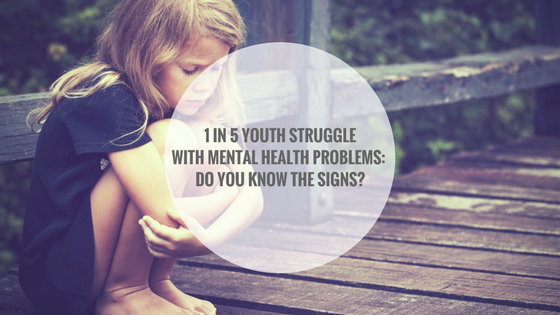Julie Entwistle, MBA, BHSc (OT), BSc (Health / Gerontology)
I was recently reviewing my daughter’s school handbook and noticed the section on child and youth mental health. According to this (and the Canadian Mental Association) 1 in 5 children and youth struggle with mental health problems. While great strides have been made over the last several years to destigmatize and demystify mental health problems in both adults and kids, I feel this remains generally misunderstood. In my practice, I still see the common misperceptions that people with anxiety don’t leave the house or appear nervous and anxious in public, or that people with depression sleep all day, don’t attend to their appearance, and sit around crying and feeling sorry for themselves. The truth is that mental health is a spectrum, or a continuum if you will. It can vary and no one’s experience will be the same. In children, mental health problems can present differently.
As per the handbook I was reading, the signs might include:
· Anxiety and fear that does not go away
· Frequent crying and weepiness
· Loss of interest in activities that were a source of pleasure in the past
· Difficulty concentrating
· Lack of energy or motivation
· Problems at school with falling marks
· Withdrawal from family, friends and school activities
· Increased school absences
· Loss or increase in appetite
· Sleeping too much or too little
· Increased irritability, anger or aggression
· Neglect of personal appearance
· Frequent stomach aches or headaches
· Increased alcohol or drug use
In general, parents should be able to monitor most of these and overt changes might be obvious (suddenly disconnecting from friends, drastic changes in grades, behavior change at home, quitting enjoyed activities, not eating food or participating in meal times, etc). But like with the continuum of mental health in adults, some of these might present some days and not others, or be so subtle that they deteriorate very slowly over time. As parents of teens we need to be the barometer for our kids as they may lack the ability to relate some of these signs to mental health or internal struggle.
Luckily, in Southern Ontario anyway, I see the mental health problems of kids being taken seriously and there are publicly funded community supports available. But getting your child connected with these can be the challenge. It can be hard to convince a teen to do anything they don’t agree with, let alone getting them to the myriad of appointments with doctors and clinicians that can help.
Occupational therapy plays many roles in helping kids and teens address issues with mental health. While some occupational therapists are trained to provide psychotherapy, others use meaningful and enjoyable tasks to help with mood elevation, reactivation and reengagement. We are skilled at looking beyond the obvious to get a better sense of what might help at home, school or in the community to get your child or teen on track. Sometimes it is as simple as helping them to reorganize their school work, create a process for managing assignments and tests, teaching them how to study in a way that works for them based on their learning style, or even looking at how their week is managed to make changes. Occupational therapists tackle things like sleep / wake schedules, eating and diet, activity participation, grades and school success, managing friends and relationships, motivation through engagement, and dealing with negative pressures that create more stress and anxiety.
My advice if you are concerned about your child? Start with your family doctor and discuss your concerns, even if your child won’t attend with you. Involve the school in your concerns to get their support and guidance, after all your child spends several hours a day in their supervision and care. Teachers can be a great resource and form of support as well, but you need to open those lines of communication. Don’t expect the school to come to you – often they don’t. If your child is in crisis, call your local Crisis Outreach and Support Team (COAST) and ask them for help. They can (and should) also connect you and your child to other community programs.
If you have coverage for mental health treatment for your teen (extended benefits, other insurance funding, out-of-pocket), including occupational therapy, consider enlisting a private therapist. Private therapy often provides a larger scope of service, is more specialized, and can be provided over a prolonged period if appropriate. Any good private therapist will try to work themselves out of a job by getting your child on track as quickly as possible and they will want you to immediately feel the benefit of their involvement. Also, if you have private dollars or insurance coverage, I would suggest a psycho-educational assessment. These are extremely thorough “brain tests” that look at all aspects of how your child processes information, manages cognitive tasks and addresses the complicated relationship between our brain and our emotions. The outcome of these assessments can be extremely helpful and will provide both you as a family, and the school, with suggestions for how to best help your child to succeed.
I have always said watching my kids grow up is the best and worst part of parenting. It is especially heart-wrenching if your child is struggling. Watch for the signs, talk to your child and get them (and you!) support if they need it.

